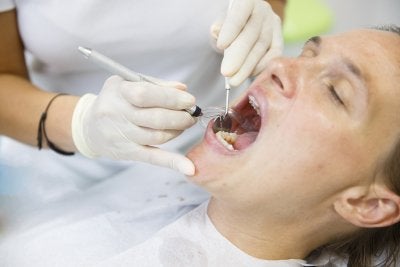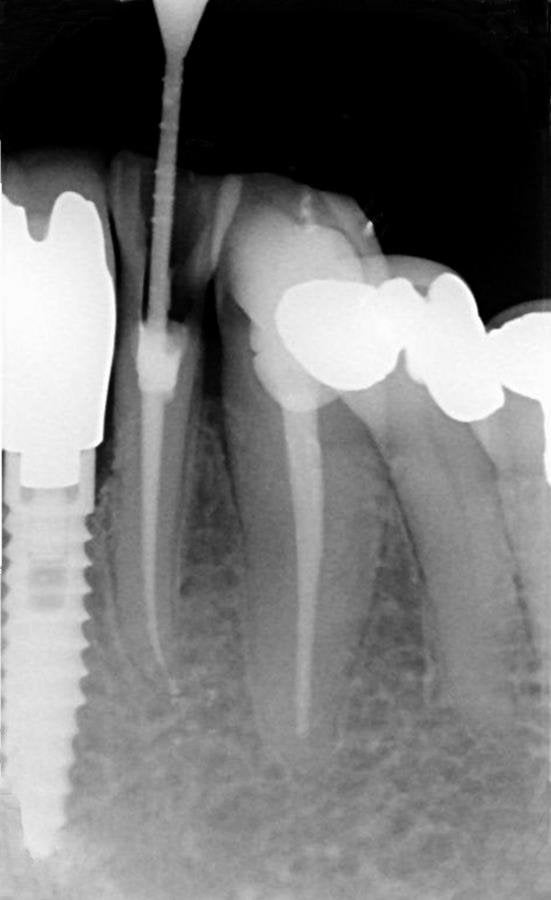-
What to Do In a Dental Emergency
It’s common knowledge that it’s important to see a dentist every six months for an exam and professional cleaning, but there are some situations that call for an additional visit to a dental clinic in Bel Air, MD. You should see an emergency dentist if you experience oral injuries, significant dental pain, or tooth trauma such as a dislodged tooth. While you’re on your way to the emergency dentist’s office, there are some steps you can take to ease your discomfort.

Toothache
Minor toothaches might not always require emergency dental care. Sometimes, they’re caused by food debris trapped between the teeth. Swish warm water around your mouth and use dental floss to gently clean between your teeth. Never apply aspirin to the gum tissues; instead, you can apply a cold compress to the exterior of your mouth. If your toothache doesn’t go away, you should call an emergency dentist.
Chipped or Cracked Tooth
Chipped and cracked teeth are not an uncommon problem. If possible, save the chipped pieces of the tooth. Rinse your mouth with warm water. If the gums are bleeding, apply a piece of sterile gauze for about 10 minutes to stop the bleeding. Then, visit an emergency dental clinic and be sure to bring the chipped pieces of your tooth. While you’re on your way there, you can apply a cold compress to the exterior of your mouth to relieve your discomfort.
Partially Dislodged Tooth
A cold compress can also relieve the pain of a partially dislodged tooth. If need be, you can take an over-the-counter pain reliever. These are only temporary measures; see an emergency dentist as soon as possible.
Avulsed Tooth
An avulsed tooth is one that has been completely knocked out of the mouth. It might still be possible to save a knocked-out tooth if you get to the emergency dental clinic in time. Pick up the tooth, holding it by the crown. Rinse it with water if it’s dirty, but do not scrub it. It may be possible to reinsert the tooth into its socket; be sure it faces the correct way. If not, place the tooth in a cup and cover the tooth in milk. If you do not have any milk, add water and a pinch of salt. See your dentist within an hour.
-
Aging and Oral Health
Good dental care is important at every age. As you grow older, your dentist might alert you to some problems that you may be at risk of. Aging can bring about changes in the dentin just underneath the enamel. This can cause your teeth to appear dull or darker. A quick trip to a dental clinic near Bel Air, MD , can easily correct this problem. Consider talking to your dentist about teeth whitening or porcelain veneers.
Watch this brief video for some helpful tips on taking good care of your teeth as you enjoy your golden years. This dentist recommends chewing sugarless gum to stimulate the release of saliva if you experience dry mouth due to certain medications. She also recommends making regular dental check-ups, brushing and flossing thoroughly every day, and limiting snacking between meals.
-
Spotting the Signs of Gum Disease
It’s important to visit your dentist in Bel Air, MD, regularly for routine dental care, including professional dental cleanings and exams. This will give your dentist the opportunity to catch early warning signs of dental problems, such as early warning signs of gum disease . Here is a guide to spotting the signs of gum disease, so that you can quickly make an appointment at your dental clinic if necessary.

Recognizing Gingivitis, the First Stage of Gum Disease
Gingivitis is the first stage of gum disease, but its progression can be slowed or stopped with proper dental care. The warning signs of gingivitis include mild to moderate inflammation of the gums. Your gums may be red, swollen, and may bleed easily. If your dentist does not quickly treat gingivitis, it can progress to more serious stages of gum disease. Your dentist will determine the most appropriate dental care necessary for your symptoms. This may include daily brushing and flossing, using specialized prescription dental care products, and visiting your dentist regularly for dental cleanings.
More Severe Symptoms of Periodontal Disease, Also Known as Gum Disease
Without regular, daily dental care, gingivitis may progress to more serious stages of periodontal disease, which is also called gum disease. Periodontal disease causes the gums to begin to recede or pull away from the teeth. This creates pockets in the gums that can become infected with bacteria. As the infections spreads, your risk of tooth loss greatly increases. You cannot treat periodontal disease at home, but instead must visit a dentist for specialized dental care.
Signs of Advanced Periodontitis
If gum disease is untreated, it will progress to a condition known as advanced periodontitis. In this stage of gum disease, your dentist may have to perform tooth extractions to remove damaged or diseased teeth. Your tooth will then have to be replaced with a dental implant or dental bridge. Your dentist will first attempt to treat advanced periodontitis using a non-surgical dental care method known as scaling and root planing. This is basically a very intense, thorough dental cleaning during which the dentist removes plaque, tartar, bacteria, and infection from your teeth and gums. If this is ineffective, your dentist will recommend surgical dental care.
-
Missing Teeth and Your Health
If you are missing teeth due to tooth decay, trauma, or a tooth extraction near Bel Air, MD, your dentist will recommend replacing your missing teeth with prosthetics . There are a few cosmetic dentistry options for replacing missing teeth, including dentures, dental bridges, and dental implants. If you don’t seek restorative or cosmetic dental care, you may develop serious complications and health problems.
Watch this video from the American Dental Association to learn more about missing teeth and your health. If your dentist doesn’t replace your missing teeth with cosmetic dentistry restorations, you may suffer from shifting or crooked teeth, jawbone loss, facial deformity, and difficulty eating and speaking. When dentures or dental bridges are anchored to your jawbone using dental implants, you can reduce your risk of health problems. You can also restore your smile, and ensure that you can comfortably eat, speak, and maintain your dental care routine.
-
Save Your Tooth with a Root Canal
If you have a severely infected tooth, you may need to visit an emergency dentist in Bel Air, MD. An emergency dentist can attempt to save your tooth via a root canal procedure , rather than resorting to a tooth extraction. Root canal procedures are a safe, effective method of emergency dental care, and can prevent your infection from spreading while preserving the integrity of your infected tooth.
Prior to your root canal, your dentist will administer anesthesia. He may also give you a mild sedative to help you relax during the procedure. This will ensure that you remain comfortable and pain free throughout your dental care procedure. Once the anesthesia is in effect, your dentist will drill a small access hole into your infected tooth. He will use special dental tools to remove diseased or infected dental pulp, tooth nerve, and tissue from your tooth.
He will then fill the tooth cavity with medication to completely eradicate your infection. Then, he will seal the access hole with dental putty to prevent bacteria from entering. He may place a dental crown on the tooth to preserve its structural integrity and prevent a broken or chipped tooth.

RECENT POSTS
categories
- Uncategorized
- General Dentistry
- Toothache
- Emergency Dentistry
- Family Dentistry
- Receding Gums
- Cosmetic Dentistry
- Veneers
- Gum Disease
- Gingivitis
- Dental Crowns
- Orthodontics
- Dental Implants
- Root Canal
- Wisdom Teeth
- Teeth Whitening
- Your Smile
- Composite Fillings
- Lumineers
- Dentures
- Invisalign
- BrightSmile
- Dental Bridge
- Abscessed Tooth
- Sealants
